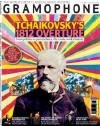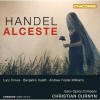Texte paru dans: / Appeared in:
*

GRAMOPHONE (08/2012)
Pour s'abonner /
Subscription information
Chandos
CHA0788

0095115078822
Consultez toutes les évaluations recensées pour ce cd
~~~~ Reach all the evaluations located for this CD

Reviewer: Richard Wigmore
Curnyn’s EOC
restores rare Handel incidental music
Covent Garden director John Rich evidently overreached himself when, in
1749, he planned Alceste — play by Tobias Smollett, modelled on
Euripides, incidental music by Handel — as a multimedia extravaganza, with
separate casts of singers and actors, and lavish scenery by Giovanni
Servandoni. Soon after rehearsals began the project was aborted, probably
because Rich had taken fright at the mounting costs, though Smollett’s
famously short temper may have played its part. Never one to waste a good
tune, Handel recycled most of the numbers the following year in the
allegorical ode The Choice of Hercules. While this gets an occasional
airing, the original Alceste music is a serious Handelian rarity: I
can trace just two previous recordings, including a fine one from
Christopher Hogwood (L’Oiseau Lyre, 12/98), both of which have slipped out
of the catalogue.
The arias and choruses for assorted gods, muses, sirens and shades, plus instrumental numbers (among them an impressive, Gallic style Passacaille filched from the opera Radamisto), are in Handel’s most beguiling vein, sometimes with a distinct whiff of Purcell: say, in the voluptuously melancholy chorus ‘Thrice happy who in life excel’, and the tenor aria ‘Tune your harps’. Other highlights include the chic gavotte for soprano and chorus ‘Still caressing’ — first cousin to Semele’s ‘Endless pleasure’ — and the muse Calliope’s lulling ‘Gentle Morpheus’, exquisitely scored for four- part strings.
On this new recording Christian Curnyn and his
trim period band give full value to the music’s sensuous charm, phrasing
alluringly in the slower numbers and keeping the rhythms lithe and springy.
Bass-lines are always vitally shaped. The 12-strong chorus sings with youthful
freshness and the three soloists are ideally chosen. Andrew-Foster Williams is
incisive without bluster in Charon’s balefully cheerful ‘Ye fleeting shades’.
Benjamin Hulett is both mellifluous and athletic in his three arias, while Lucy
Crowe displays her nimble coloratura technique in tee frolicking ‘Come fancy’,
and brings a limpid purity of line in ‘Gentle Morpheus’. First-rate Chandos
sound and presentation, with a stimulating essay from David Vickers, complete an
hour of hedonistic Handelian delight.
Cliquez l'un ou l'autre
bouton pour découvrir bien d'autres critiques de CD
Click either button for many other reviews


